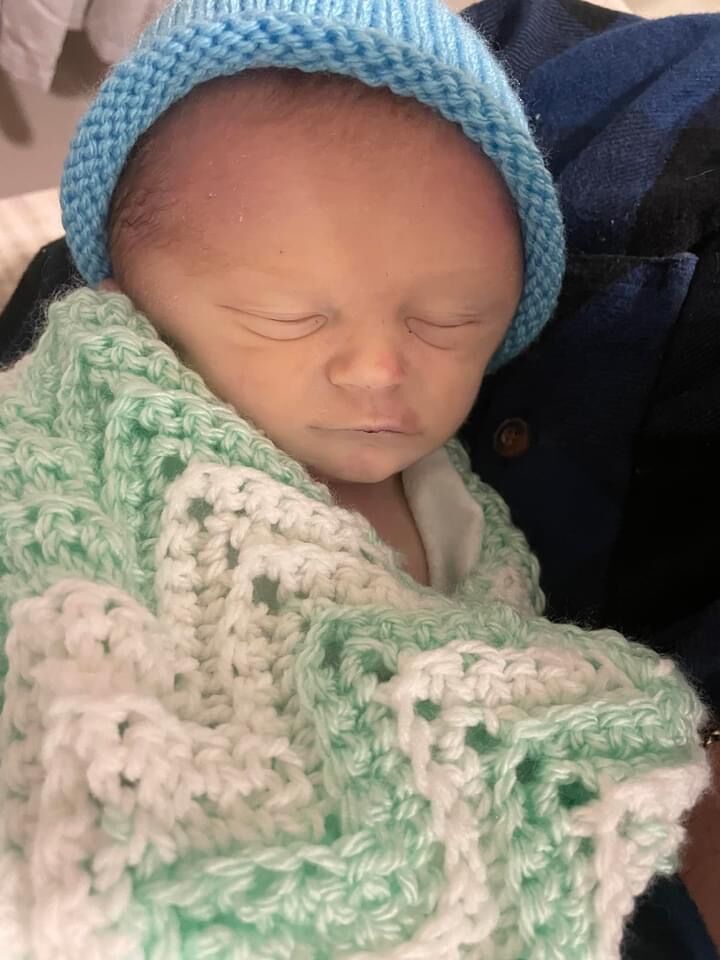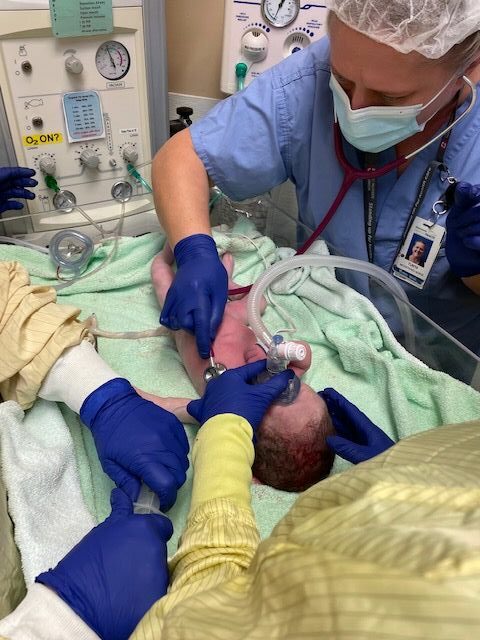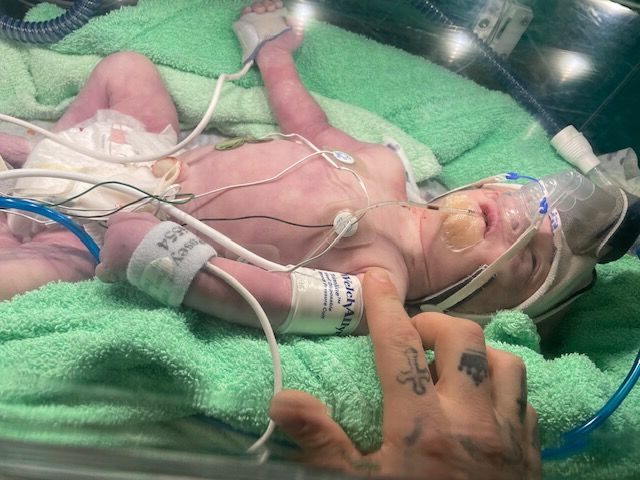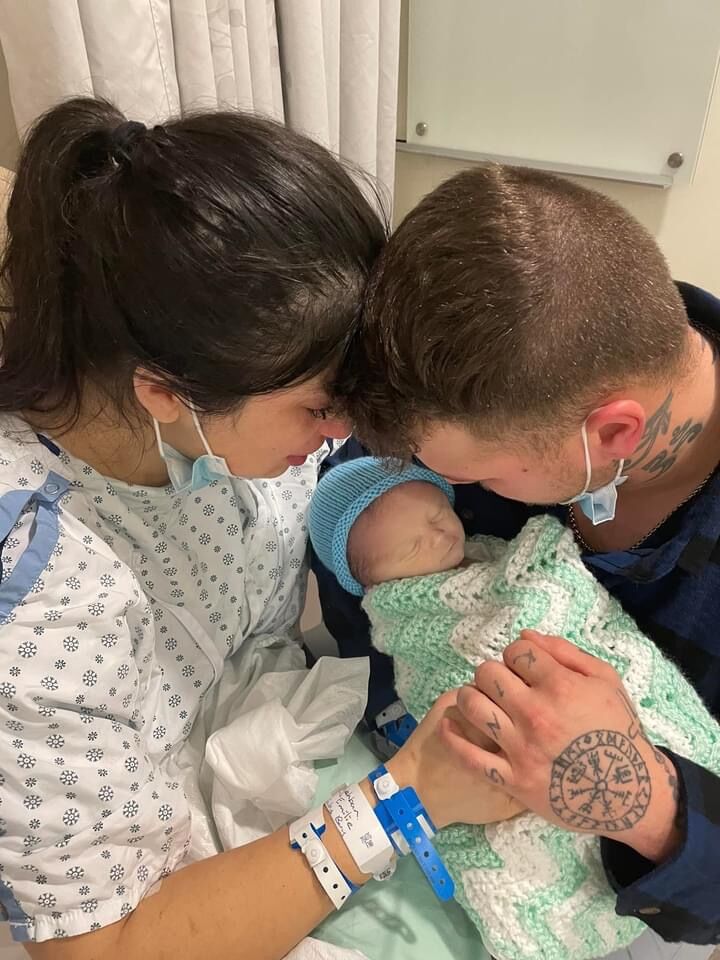Told by his mother, Emilie
“Shock. Anger. Confusion. How could this happen? How could my baby boy be gone? How could he be gone, when I did everything I could to protect him? My boy, my son.
I did everything right; I took my vitamins, I tried to eat well, and I tried not to sleep on my back. I caressed my belly and spoke to him with excitement as I awaited his arrival.
Why did I trust the hospital? Why did I trust the doctor? Why did I believe the medical team, when they told me that everything would be all right?
Our son, Nathaniel Achilles Nicolas Addison, died from a traumatic delivery. He was a perfectly healthy baby boy throughout my pregnancy. My water broke at 37 weeks on February 2nd, 2022, at 4 a.m. After calling the hospital, I proceeded to go there, as per their instructions. However, due to my lack of dilation, they gave me some morphine and sent me home. I came back a few hours later with stronger contractions, and again was given morphine and sent home. The third time I went, they ended up keeping me in the hospital, as I insisted on staying.
Due to a lack of staff, they waited 36 hours to induce me. I kept repeating that I was in fear of an infection, which could yield serious side effects, as I had previously been a cervical cancer patient. Fertility doctors had informed me that due to scarring from cancer-related surgeries, I would most likely be unable to conceive.
After 36 hours, which was past the recommended 24 hours, a doctor finally came to see me. She insisted that I have a natural childbirth, although I told her that I was completely fine with a C-section. I’ve had several previous surgeries, and I wanted only what was best for my son. At the doctor’s insistence, I attempted to push. However, my son couldn’t get past my pubic bone. My bone structure was too small to give birth vaginally, but for three and a half hours, the doctor kept telling me to push. Again, I told her multiple times during the delivery that I was fine with having a C-section. She was determined to get him out naturally, even though it wasn’t physically possible. I also developed a fever while pushing.
The doctor told me that she would vacuum him out, using a Ventouse (vacuum cup). I didn’t know what that meant. In the room, the doctor did not acquire informed consent, this being permission granted in the knowledge of the possible consequences, which is given by a patient to a doctor for treatment with full knowledge of the possible risks and benefits. She simply stated that she could get him out that way. So we trusted her, as any reasonable patient would. The room was also full of nurses who witnessed this interaction. The doctor attempted to vacuum him out for 25 minutes, which was past the 20-minute allowance for vacuuming. Three times, during this 25-minute interval, the vacuum cup made a noise, popped off my baby’s head, and turned itself off.
The hospital staff, including the doctor and nurses, waited four and a half hours, while having me push, before they performed an emergency C-section. My baby was so stuck in my pubic bone from the vacuuming procedure that the doctor applied a lot of pressure—too much pressure—to his head to get him out, she admitted to me later. After the delivery, the doctor approached me, telling me that the C-section should have been done earlier and that it was her fault. She said this in front of one of the nurses at Lions Gate Hospital. She repeated that she was so sorry and that this was all her fault. I even told her that I was worried that I may have pushed him out too hard. Again, she said that she was to blame. She gave me her personal phone number. Looking back, this made me think that she felt guilty over this course of action.
At 8:45 p.m., the medical team was finally able to get my son out of me, but he didn’t cry. He was put on a respirator by the nurses, and they told my partner that Nathaniel was breathing on his own. He was taken to the NICU, as they felt he needed some assistance with his breathing. They focused only on his breathing, which was unexpected, considering all newborns are supposed to be given a full examination immediately after birth. None of the hospital staff noticed the skull bleed until a few hours later. They came into my room, telling us that they hadn’t noticed the bleeding for a few hours, but now they had. They did not have the right equipment to see what was wrong. He wasn’t taken to Children’s Hospital until 1:00 a.m. via ambulance.
Nathaniel was born at about 8:45 p.m. and wasn’t sent to Children’s Hospital until 1:00 a.m. He died in my arms at 5:00 a.m. His head was so swollen from the skull bleed that the hat they put on him barely fit.
A paediatrician at Children’s Hospital informed me that Nathaniel had died from multiple-organ failure due to birth asphyxia and a skull bleed. Birth Asphyxia is defined as a lack of oxygen and blood flow to the brain before, during, or right after birth. From what I’ve been told, the skull bleed occurred due to the suction from the vacuum cup and the doctor’s pressure on his skull when she was attempting to take him out. She apologized for this and took responsibility for it multiple times. Again, I did not provide informed consent to the vacuuming and was not advised of the known risks inherent in that procedure.
The paediatrician told me this was an extremely traumatic delivery and that he had never seen a situation like this before. He also stated my baby had a heart attack due to the stress of the delivery. He also believes that the delivery doctor may have fractured Nathaniel’s skull from the pressure being applied. My son, Nathaniel, died due to a failure to provide proper medical care and attention and the absence of full disclosure of relevant information with the known risks and benefits. Taking on such a procedure and failing to provide proficient medical care from the delivery doctor amounts to negligence on the part of the medical staff.
A few days later, one of the paramedics who provided the hospital transfer from Lions Gate Hospital to Children’s Hospital recognized my partner while he was out in the community. He apologized profusely for the situation and said that Lions Gate Hospital should never have waited that long to call them. He stated that had they called earlier, my son would still possibly be alive. He corroborated that it was not a busy night for ambulance calls and they would have been there earlier had they been called on time.
After the traumatic pregnancy, I was also diagnosed with endometritis, which is an inflammatory condition of the lining of the uterus that is usually caused by an infection. I also acquired a kidney infection due to the prolonged 40 hours of labour, followed by the C-section. The C-section caused even more infection. I was not prescribed antibiotics when I was released from the hospital. I have been told by several doctors that this is highly unusual, considering the length of the labour and the fever that developed from the pushing, as well as from the emergency C-section. Due to these complications, I was in and out of the hospital for three weeks after delivery, adding to our trauma and stress. Overall, I was thereafter put under four different antibiotics, both oral and IV.
This experience has made me question whether the Hippocratic Oath has long been forgotten in our medical community, this being an oath that a physician makes in performing their medical duties which pledges to prescribe only beneficial treatments, according to their best abilities and judgment, and to refrain from causing harm. We understand the challenges faced by medical staff in these unprecedented COVID times. We understand the staff shortages and the long hours. However, these issues were around long before COVID happened. It should not serve as an excuse for our loss. When one wants to become a nurse or a doctor, working under stress and pressure is implied and expected. If one is unable to perform their obligations in a reasonably competent manner, they should not be working in that field performing such duties.
The doctor in charge, insisted that I have a natural childbirth and ignored all the red flags during my labour. She did not provide us with a list of the known risks and consequences. She did not acquire informed consent in undertaking the Ventouse vacuum cup procedure. One wonders if the lack of competent judgment exercised were due to medical employees being overworked or simply poorly trained.
I had remembered a year before, when I learned of another case of medical negligence at Lions Gate Hospital involving the wrongful death of Natasha Forry. When that story was published on the ‘In Their Name’ website I had both read the story and petitioned my MLA regarding the modernization of BC’s wrongful death laws.
I was shocked and sickened that just a year later, now my son had been wrongfully killed due to medical negligence at the same hospital. I came to realize the full measure of the impact of my son’s life being considered worthless under BC’s discriminatory wrongful death laws.
Currently in BC, the value of a human life is measured only by the deceased’s future lost income so long as they had dependents. These are known as economic damages, or “pecuniary damages”. Unlike other provinces, under BC’s wrongful death laws, “non-pecuniary”, or non-economic damages are excluded. This means that damages relating to loss of care, guidance, love, affection, and companionship are not valued in BC, as they are in other jurisdictions. These damages would allow us to pursue justice and hold the wrongful parties accountable so the same preventable medical errors do not happen to another family.
Despite my own previous advocacy and letter to my MLA which went ignored, now my baby has been a victim, and our family has been forever impacted.
How is British Columbia the last province to take steps towards innovation and basic human rights? We, as Canadians, pride ourselves on our socialized medical system. We should serve as an example to the world. Instead, we are provided with second-rate care in a first-world country. We trust our doctors and nurses to have our best interests at heart. We trust them to put their self-interests and egos aside and administer reasonably prudent and competent care. We trust them to bring our children into this world. However, if there is no financial deterrent mechanisms in place when someone is wrongfully killed, then there will never be any financial incentive to retrain medical staff to prevent these same medical errors in the future.
We now are looking to the volunteer families behind The BC Wrongful Death Law Reform Society to help bring this injustice to light and work towards bettering our medical system. The only way to make changes, in this case, is to allow for the law to change and give children, the elderly, and the disabled a voice. We should be permitted to hold those in charge accountable for their actions; otherwise, how do we move forward toward bettering this broken system? The doctors, nurses, and the hospital should not be given an automatic free pass when their actions lead to a tragic and avoidable wrongful death.
We expected to bring our son home, which we will never get to do, due to the negligent decisions taken by the hospital.
Rest in peace, my son, Nathaniel Achilles Nicolas Addison.”
Media Coverage
CBC News: Death of couple’s ‘miracle’ baby after difficult delivery at B.C. hospital prompts review
CTV News: Mothers for Justice Memorial Walk 2022
Global News: March to change B.C.’s wrongful death laws
CTV News: B.C. families seek justice for lost loved ones, call for wrongful death law reform
Ici Radio-Canada: Une mère réclame justice après la mort de son bébé
English Translation: Ici Radio-Canada: A mother demands justice after the death of her baby








 ‘In Their Name’ is the campaign of ‘The BC Wrongful Death Law Reform Society’ – a BC registered non-profit organization comprised of volunteer families who have lost a loved one to wrongful death in BC and were denied access to justice. In response to the biggest human rights issue facing the province today, our goal is to modernize British Columbia’s antiquated wrongful death legislation, which predates confederation (1846). Under current legislation, the value of a human life is measured only by the deceased’s future lost income, so long as they had dependents.
‘In Their Name’ is the campaign of ‘The BC Wrongful Death Law Reform Society’ – a BC registered non-profit organization comprised of volunteer families who have lost a loved one to wrongful death in BC and were denied access to justice. In response to the biggest human rights issue facing the province today, our goal is to modernize British Columbia’s antiquated wrongful death legislation, which predates confederation (1846). Under current legislation, the value of a human life is measured only by the deceased’s future lost income, so long as they had dependents.